- Home
- Carol Bruneau
Glass Voices
Glass Voices Read online
Praise for Glass Voices
“Bruneau is a gifted storyteller, and the sense of place and time is remarkable… This novel is so rich in detail and emotion that a first reading merely opens the reader to an appreciation of its gifts. Its density submerges the reader in a complete world of character, plot and setting… Bruneau manages to show both the roughness and tenderness of life, and infuse this novel with a palpable reality… Glass Voices illustrates the immense strength some people have to cope with tragedy—-and that is truly inspiring.”
–The Globe and Mail (A Globe and Mail Best Book, 2007)
“Carol Bruneau’s remarkably intricate, textured and complex novel Glass Voices, published 90 years after the blast, is a heroic response to the [Halifax Explosion]… Her story of one family’s life in the aftermath of the explosion is a deeply compassionate rendition of how cataclysmic rupture continues to reverberate and repeat itself in survivors and their descendents through their lives… A saline stoicism runs like a current through Glass Voices, seeming to say that suffering and hope wash over us in alternating waves, and how valiantly we struggle to stay afloat is what measures the content of our character.”
–Literary Review of Canada
“[Observing and remembering] is evident in her strong stories and the vividness with which she creates worlds for her characters. It is as if entire tableaus have been remembered and accessed to allow Bruneau to paint with words… In Glass Voices, Bruneau achieves the seemingly impossible. Her depiction of Halifax during and immediately after the explosion is as vivid as if she were an eyewitness recording the sights and sounds… A reader just discovering Bruneau’s work might also feel like a kid in a candy store… The body of work Bruneau has created over several decades has been compared to the writings of Margaret Laurence, Carol Shields and Alice Munro.”
–The Chronicle Herald
“Demonstrates how profoundly love shapes lives, no matter what else happens…textured and rich.
–Quill and Quire
“Carol’s writing is beautiful, and she has an amazing gift as a storyteller.”
–Atlantic Books Today
“Displays the barely restrained virtuosity of a talented writer…Bruneau, on a whole, is a pleasure to read.”
–Canadian Literature
“Deftly marrying history with fictional lives in a complex tale spanning more than 50 years, the narrative is rich in era-appropriate detail, threading smoothly…back and forth through those five decades. It is a measure of Bruneau’s artistry that the read is so seldom distracted by the ever-changing alignment of current and retrospective settings…Glass Voices is perhaps Bruneau’s most challenging work.”
–The Coast
“It would be possible to write a novel about the Halifax Explosion that focuses on the disaster and despair of the moment, or one that offers a sentimental version of recovery. Bruneau has accomplished the much more difficult task of showing just how hard life is in the years after the Explosion, while also demonstrating how it may be possible to find hope even when every aspect of life seems to disappoint.”
–The Diocesan Times
“Award-winning author Carol Bruneau brings the characters to life with empathy, insight and humour.”
–The Guelph Mercury
“Bruneau has done well to relay the necessity of moving on amidst the challenges of contemporary life.”
–The Daily News
Copyright
Copyright © 2007, 2018, Carol Bruneau
All rights reserved. No part of this book may be reproduced, stored in a retrieval system or transmitted in any form or by any means without the prior written permission from the publisher, or, in the case of photocopying or other reprographic copying, permission from Access Copyright, 1 Yonge Street, Suite 1900, Toronto, Ontario M5E 1E5.
Vagrant Press is an imprint of
Nimbus Publishing Limited
3660 Strawberry Hill Street, Halifax, NS, B3K 5A9
(902) 455-4286 nimbus.ca
Originally published by Cormorant Books Ltd. (2007)
Printed and bound in Canada
NB1373
Cover image: Ripped Open, oil on canvas, 48 x 72, by Lynn Misner
This story is a work of fiction. Names, characters, incidents, and places, including organizations and institutions, either are the product of the author’s imagination or are used fictitiously.
Library and Archives Canada Cataloguing in Publication
Bruneau, Carol, 1956-, author
Glass Voices / Carol Bruneau. — 10th anniversary edition.
Originally published: Toronto: Cormorant Books, 2007.
Issued in print and electronic formats.
ISBN 978-1-77108-642-4 (softcover).
—ISBN 978-1-77108-644-8 (HTML)
I. Title.
PS8553.R854G53 2018 C813’.54 C2017-907996-4 C2017-907997-2
Nimbus Publishing acknowledges the financial support for its publishing activities from the Government of Canada, the Canada Council for the Arts, and from the Province of Nova Scotia. We are pleased to work in partnership with the Province of Nova Scotia to develop and promote our creative industries for the benefit of all Nova Scotians.
Dedication
In memory of my beloved dad, John Bruneau.
Quote
And what can this sorrow be? It is brewed by the earth itself. It comes from the houses on the coast. We start transparent, and then the cloud thickens. All history backs our pane of glass. To escape is vain.
— VIRGINIA WOOLF, JACOB’S ROOM
1
1969
STICKY AS GRASSHOPPER MOLASSES, this is the last, the frigging last day (put that in your glass and guzzle it, Harry Caines!) anyone or their dog should be slaving over a stove. Easy for him, though, upstairs lollygagging as per usual. Rules for one aren’t always rules for another. But there it is: make hay—make pickles—while the sun shines. Make whoopee, Harry would say, yes he would, shame, shame, and at his age. But what else is new? Here she is, knuckled down on all fours, searching for the right pot. At least the linoleum’s a friend: its coolness, never mind the pain like a spike through each knee! Lordie, she can almost picture the Herald headline: Lady found petrified in Armview kitchen, while hubby shaves.
Like Lot’s wife in the Bible, how about that? Turned into a pillar of salt—enough to do up ten batches of dills. But first things first: she’s got to find that canner. It could be animal husbandry, digging inside the cupboards; what was Harry thinking when he installed everything lock, stock, and barrel? It’s as if something’s curled up and died: the dust!
What the heck’s he doing up there? “Harry?” Is he alive? “Better get moving, if you’re planning to—”
A burst of song burbles through the ceiling, that quavery tenor, “Oh Danny…oh cranky Boy,” through how many layers?
Mopping her brow, she cannot help herself. “Get a move on, mister!”
Typical, so typical. “The pipes, the pipes are…”
And what does he have against Bick’s, anyway? They’re just as good. But try telling him, waltzing in the other day with ten pounds of cukes. Baby peckers, Rebecca, her daughter-in-law, called them, making even Harry blush. Well. He’s not the one on his knees, is he? And his aren’t full of arthritis, not like hers, stiff and blue as the day she almost died but didn’t.
“Hurry up! If you hope to get there any time soon…” Trained on the trickling inside the wall, her voice bounces off the plaster.
“…are ca-a-alling.” The words get sliced in two, then drowned out by the lawn mower starting outside. Harry’s no Charlie Chamberlain, and h
e’s certainly no Mel Tormé.
“Harry? You’ll want to catch the boy before—” She has to scream above the noise, and yet, isn’t it true? There’s always something to be grateful for. The fact that that old bird next door has finally replaced her push mower with a gas one: que-ching que-ching que-ching all the livelong day, for how many years? Still, the high-powered roar rocks the jars lined up on the counter. Short term pain for long term gain? Well, at least it’s not winter; it could be snowing, and pickling beats pushing up weeds, or daisies.
“Robert’s going to wonder where on earth you’re at—Harry?”
“From glentoglen, and…”
“He’ll think you got lost.”
“Dooooown the mouuuntain…”
“If you’re giving him that talking-to, better get your Londonderriere over there—” A tower of pots gives, and, lo and behold, with a crash of lids, the canner wiggles free. Something small and cool grazes her fingers, too perfectly round to be a pea. A marble.
“Harry, for heaven’s sake…”
Neither a cat’s eye nor a pretty, neither a doughboy nor a peewee, it’s somewhere in between. If she stuck it under their son’s and Rebecca’s queen-size mattress, well, that princess would feel it; on that Lucy would place money. In her palm it’s the colour of bathwater, a murky crystal ball, an iris-less eye. The memory that oozes from nowhere is as golden as cod liver oil: Robert, their grandson, rigging a slingshot when he was little, firing marbles for cannonballs.
“You tell him, Harry,” she mutters above the mower, “stay in school, or else.”
Then, just as unbidden, a parable springs to mind, a bit of Scripture: a woman turning her hovel upside down looking for one measly coin. Well, she and Robert searched high and low that day for a lost glassy, Robert bawling his eyes out. Imagine him bawling now—into a glass of beer, maybe.
Weren’t marbles the prime thing for little kids to choke on?
The trickling in the wall piddles out. Heaving the canner up and onto the counter like a medicine ball, she rocks back to rest. Smoothing her hem over her knees, she rolls the marble in the valley of her skirt; it clouds a printed violet. Sunday best, this dress was once; it’s still her favourite. The colour, robin’s egg blue, makes her think of early summer when she was small, and the world more tender, maybe, and softer on the eyes. Clingy and damp, the filmy polyester keeps riding up: those knees of hers look as if she’s kneeled in grease.
Do they go to this much trouble at Heinz? Dragging herself up, she drops the marble into a glass of geranium slips. Safekeeping, a keepsake. Now she’ll get down to business: rinsing cukes, nipping off stems like cords. Pouring vinegar, measuring salt. The concoction coming to a boil sounds like a distant train.
Never mind what Robert’s dad says about him staying out all hours, sleeping till noon—as if Rebecca doesn’t. Bucky, she calls him. His own mother. That nickname as bad as gum stuck to your shoe. “Harry? You don’t catch him now, no telling what he’ll choose,” she yells, half to herself, half to the ceiling. “Go on, while Jewel’s at work and her majesty’s putting on her face.”
The trouble is, she can already picture it, Harry raising his hands like Festus on Gunsmoke: “I’m not interfering. Just offering advice.” The trouble with Robert, with kids today, as far as she can see, is the parents, all the pussyfooting and kid-gloves handling. When Jewel, their son, was a boy…
Packed into clean jars, the cukes wink back: specimen frog princes. Sweat tickles her sides as she ladles in liquid. Harry loves garlic, so at the last minute she minces some and throws it in; wouldn’t have bothered, once. Nasty, that smell on her fingers, as the princes swim in their brine.
The sun and the burbling roar pour in, but not a twitch of a breeze.
Next step, the boiling bath. The water on a roll, she roots out tongs to lower in the jars. Steam curls up like the girl on I Dream of Jeannie leaving her magic bottle, and the flowers on Lucy’s dress shimmy. What’ll she do with all these pickles, anyway? Palm them off on Rebecca, after Harry’s had his fill—or the women’s league; they’re always after donations. God willing, Robert’ll be around to make short work of some, though lately he’s talking about going west—that’s after he’s moved out, quit school, bought a car, got a job: security at the yacht club, watching boats. Like watching paint dry, it would seem. Though not to Harry, who loves making reason play second fiddle, just to get her goat: “What’ve you got against a kid making money? Okay, okay, so I’ll talk to him.”
All the same, since retiring Harry’s slowly begun waking up to the future, what’s left of it. Never mind his bad eye and the bad leg that’s plagued him since the shipyards—with Robert he has, or should have, a project, when there’s nothing on TV and he’s bored with his accordion. “Pardon me, Lucy. It’s a Don Noble, not just any old ’cordine.”
Never mind. We live in hope, the pale, greeny blue of her dress still whispers, from the swish of its slippery weave. But what is keeping the man? Today’s Harry’s day for watching wrestling, enjoying a sandwich and his weekly Keith’s in front of the tube; playing along with the ads keeps him in practice. “Practice, Lucy, practice,” he’s always saying. Funny how cradling the instrument doesn’t remind him of cradling a child, or anything else for that matter. It reminds her.
The first batch of jars jiggles in the canner; the rest wait, lined up on the counter. “Harry?” Trudging to the stairs, out of patience, she hollers up: the last straw. “If you don’t get moving NOW, you’ll miss your show.”
Next door, the lawn mower scrapes something and cuts out. In the sticky silence just before it restarts, something prods her—like a hand—at first gentle, tapping her shoulder, then gripping her. She has the presence to turn off the stove, letting whatever it is propel her back to the stairs without stopping to drop the tongs. Knees and all, her body reacts, climbing, flying past the landing, the way a car remembers driving. It’s “automic,” as Rebecca calls her washing machine. Despite its stickiness, the air prickles her arms, bringing things back: air thick as lava, but icy too. Harry’s name in her throat, wedged there like a picket. Drawn upwards, her feet barely touch the plastic treads. The flash in her skull almost like lightning as the walls virtually dissolve.
Harry’s sprawled on the bathroom floor, eyes open, his good one pale and frozen. The shock is like a clap of wind. Something leaks from his blue pajamas. The instant of seeing, she launches a prayer. His cheeks glow as if he’s been on the worst tear ever. A dribble of spit, a thread of blood where he’s nicked himself. One hand—his left?—jumps like a mouse on the tiles. Slowly, slowly, rising, falling: his chest works like the Don Noble’s bellows, and in a blink, she sees herself young once more: her mouth open in a scream, gums pink as the felt edging the accordion’s keys.
“HARRY!” Her cry flies off the fixtures, bleaching the room of light and sound. She’s kneeling, the tongs splayed like forceps. Her fingertips stuck to his pulse; the hint of garlic a memory, stinky-sweet as kerosene.
His lips squirm: nothing more than a gurgle comes out.
Downstairs, she hears herself dialling, giving the address. The voice inside her is like her son’s, ordering: Start the car. Foolish, since she’s never learned to drive. She should call Jewel at work, or even Rebecca. But she can’t think, racing upstairs again, ripping the spread off the bed. Blue, it’s been washed almost white. She tucks it around him, right up to his chin. Wild with panic, that eye gobbles her up. Suddenly she’s freezing, the house is freezing, her dress clammy, wet. His cheek burns beneath her kisses. Another lightning memory: sheets dropped like moths on a harder floor.
Below, in the kitchen, the lids on the jars pop, one by one. Each sound is like a period dropped from space. Just this summer, didn’t those crazy Yanks put men on the moon? Mr. Armstrong, Mr. Aldrin. The pickles seem as alien. Then, at last, the wail of a siren, and the doorbell chimes, the bell which Harry just got arou
nd to replacing last year.
The men climb the stairs like plumbers, that unhurried and businesslike, murmuring as they probe and poke. It’s as if they don’t see her, as if she’s been vaporized, beamed upwards or drawn inside somewhere dark and airless, lured by crumbs. Prayer. A voice louder than theirs: hers. Our Father who art in Heaven, hallowed be thy Name. In the name of the Father, Son and Holy… As he’s lifted onto the stretcher, the crumbs form Harry’s name.
“Please don’t hurt him!” the same voice begs. The ambulance throws light the colour of marigolds up the stairs, and all around her goes quiet again, so quiet there’s only the maple breathing out front. The men load Harry like a loaf into an oven. Doors slam shut.
Only as they scream away does she realize she’s been left behind, leaning against the fence in her old dress and apron, the fence Robert keeps promising to paint. In a second, it too could collapse, disappear, pickets and rails blown all over creation. For now, its splintery sag is a comfort.
She should phone Jewel, but can’t think of the number. Remembering, though, to check the stove—still there, yes, the burner cool—she peels off the apron, steps into the nearest shoes, ancient espadrilles caked with dirt. The number for the taxi’s right there, though, from all the times Harry’s been off someplace, unavailable. She even remembers her purse and to lock up, going out to wait on the veranda. Clutching her bag, though all that’s there is the five for Robert’s down payment. “I’ll do it whenever,” he’s fond of saying.
As the cab cruises up, she can’t help imagining a huge, greasy cloud filling the sky, and her legs feel weak, as if every single bone has been wrenched, then slammed against dirt. Yet, there are her shins mapped with veins, otherwise pale and smooth as a baby’s arse, Harry would say. When she blinks, looking up, the sky is blue, of course.
SQUEAKY, AVOCADO-COLOURED SEATS, ASHTRAYS, AND germ-ridden magazines. The waiting room’s packed: everything feels contagious. Someone offers a chocolate bar, even a cigarette, but she can barely reply, sinking there, anchored by her purse, her calves freezing. To pray—earnestly—would mean hitting bottom: kneeling on the speckled linoleum, certain tears amid pacing feet. For thine is the kingdom, the power and the glory, for ever and ever and ever… Limping to a phone, she rummages for change. There’s something reassuring about the dime’s tiny Bluenose as she inserts it, something almost portentous. Like the feel of the marble. The first boat had sunk, but then been replaced, as if nothing bad had ever happened.

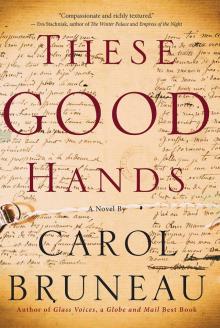 These Good Hands
These Good Hands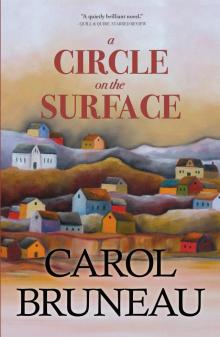 A Circle on the Surface
A Circle on the Surface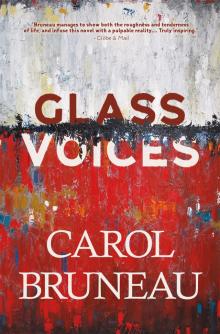 Glass Voices
Glass Voices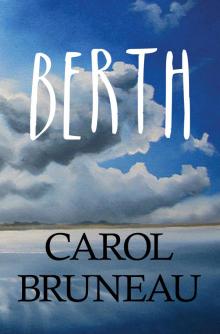 Berth
Berth Brighten the Corner Where You Are
Brighten the Corner Where You Are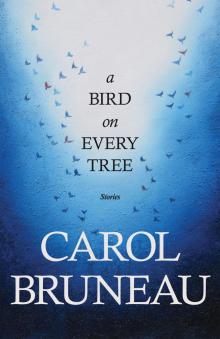 A bird on every tree
A bird on every tree